Best Graphics Cards (GPUs) for gaming in 2021
When building your next gaming PC or upgrading your current rig, the component that affects your gaming performance is your graphics card (GPU). Picking the right graphics card is the key to getting the best FPS in your favorite games.
In the olden days (anything pre-2018), picking a graphics card was simple. Have your choice from any graphics card in your budget, and you’re guaranteed good performance. Sure, there were a few differentiating factors between the two main GPU chip manufacturers, AMD and Nvidia, like G-Sync and Nvidia’s superior recording software Shadowplay. But, as for what you’d see in-game, it was basically identical.
But, with the advent of real-time raytracing, the differences between graphics cards have increased, and it can be confusing when you’re sifting through all the choices: GTX that, RX this, RTX! Don’t fret, wanderer, for this list is your savior. We at TechEngage have compiled the list of the best graphics cards to buy in 2021.
When Nvidia dropped their brand-new line of RTX 3000 series graphics cards, they lit the PC gaming world on fire. Whilst their top-of-the-line RTX 3090 made 8K gaming possible; it’s their mid-high tier 4K powerhouse that steals the show, in my humble opinion.
Bringing over 20-30% better performance than the previous gen’s highest-priced card, the RTX 3080Ti at $1200, the fact you can get true next-gen performance at only $699 makes the RTX 3080 an absolute steal.
The RTX 3080 is built on Nvidia’s brand new Ampere architecture with new ray-tracing cores delivering 2x throughput in performance.
Real-time raytracing is the cream of the crop when it comes to PC hardware, simulating the physical behavior of light to bring a realistic and cinematic gaming experience.
With dedicated tenor cores for AI deep learning, Nvidia’s propriety ai-accelerated super-sampler allows some insane leaps in FPS by using deep learning to upscale textures to higher resolutions to lighten the load on your GPU.
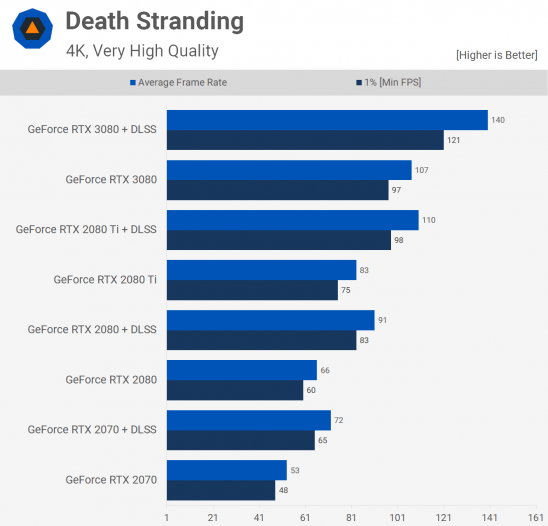
In Death Stranding, the use of DLSS sees a 37 FPS increase by switching on DLSS. This allows textures to be rendered at a lower resolution than native (for example, if you’re running at 4K, some textures may be 1440p or 1080p textures), and DLSS 2.0 uses AI to artificially “up” the resolution so that it’s imperceptible.
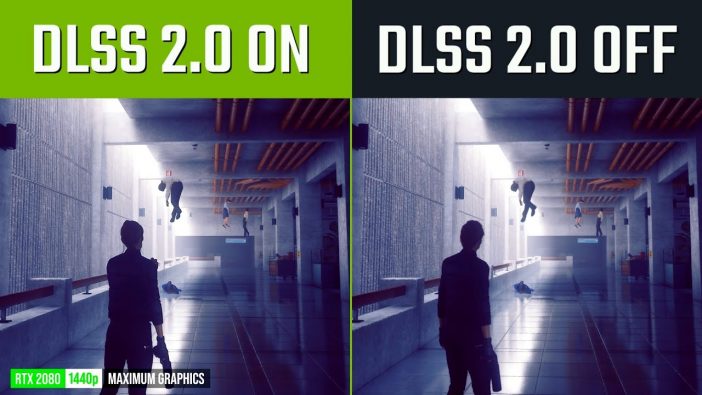
The main issue with the RTX 3080 is that, at least at the time of writing, which is early January 2021, it is virtually impossible to buy one of these coveted cards.
It’s a poor mixture of low supply caused by manufacturing shortages due to Covid-19 disruption and insanely high demand due to the true generational leap in performance over the RTX 2000 Turing cards.
But, when the RTX 3080 comes back into stock, get your hands on it and get it fast! This is truly the best card for gaming.
I’ve been covering graphics cards for 7 years now, ever since the GTX 700 series launch back in 2013, and I can wholeheartedly say I’ve never come across a graphics card that has a better bang for your buck than the RTX 3070. Exploding onto the scene in the latter half of 2020, Nvidia boasted performances matching, if not beating, the top of the line RTX 2080ti and beating out the Titan RTX in FPS performance.
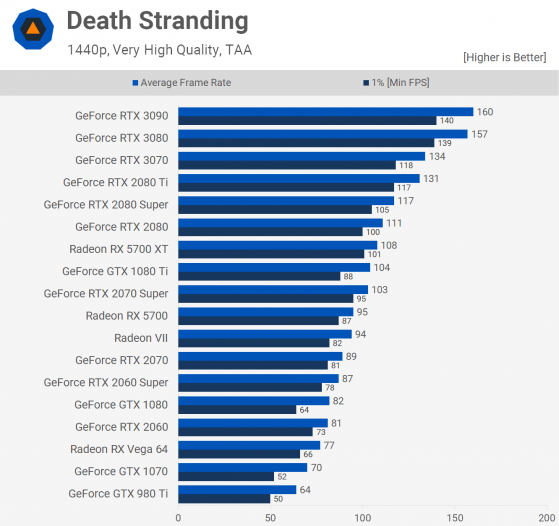
Look! The RTX 3070 only trails the 3080 by a little bit when it comes to 1440p performance, and the RTX 3080 only breaks a sweat and pulls ahead when you crank up to 4K when it can flex the extra 2GB of VRAM out of the box.
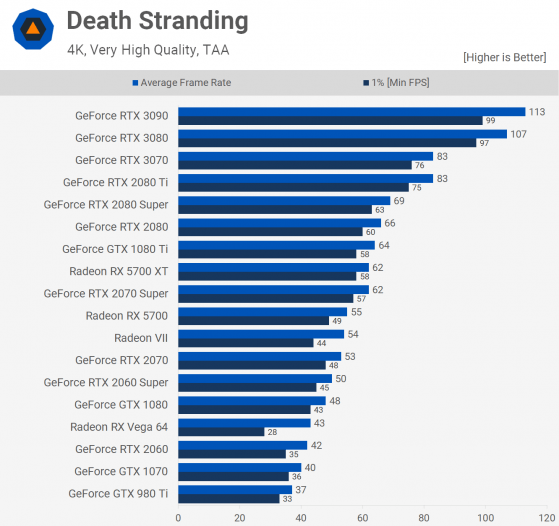
The card’s ray tracing performance certainly matches, if not beats the previous generation powerhorses, with Eurogamer’s Control raytracing benchmark seeing an average 43.9 FPS on ultra 1440p for the RTX 3070, versus 43.2 on the RTX 2080 Ti.
All this performance at an MSRP of $499! It’s nearly a third the price of the 2080Ti with matching performance. Holy smokes!
But, as with its older brother, good luck getting your hands on one of these bad boys. They’re currently out of stock, but if you find any RTX 3070 on the market by any aftermarket reseller, and you’re looking for a bang for the buck GPU, get it.
The mighty RTX 3080. This GPU is based on the Big Navi GPU architecture and represents a departure from AMD’s previous strategy of focusing on mid-tier budget graphics cards.
With an MSRP of $649, the RX 6800 XT has a $50 upper hand on the RTX 3080, and especially if you can’t get your hands on team green’s powerhorse, the RX 6800 XT is a compelling deal.
In some games, without ray-tracing, the AMD RX 6800 XT beats out even Nvidia’s highest priced 3000 series offering the RTX 3090. For example, at 1440p, you can expect to see similar if not better performance
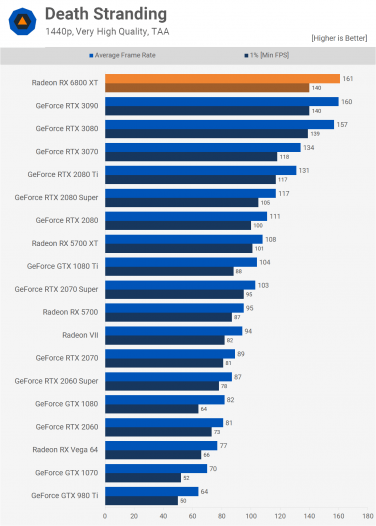
The RX 6800 XT falls behind at 4K, though, where the added VRAM and DLSS kick in for Nvidia to allow the RTX 3000 series cards to edge ever so ahead. In Death Stranding, the RTX 3080 beats out the 6800 by a mere 5fps. Not bad, AMD, not bad.
The RX 6800 XT, rather than moving to a 5nm process like Nvidia for 2020, has chosen to stick to their 7nm process and instead focus on efficiency improvements and extra features.
One of these grand new features includes Infinity Cache, a global cache that speeds up GPU memory access. This helps give AMD a ‘leg up’ in performance to make up for the lost headway against Nvidia due to the RX 6800 XT rocking the slower GDDR6 memory, compared to the RTX 3000 series GPUs’ GDDR6X memory.
The biggest addition, however, is the inclusion of dedicated compute cores to act as ray tracing acceleration. Whilst AMD’s real-time hardware accelerated ray-tracing doesn’t quite match RTX + DLSS, the Direct 12 Ultimate compliant offering from team red is more than enough for forays into the world of ray tracing.
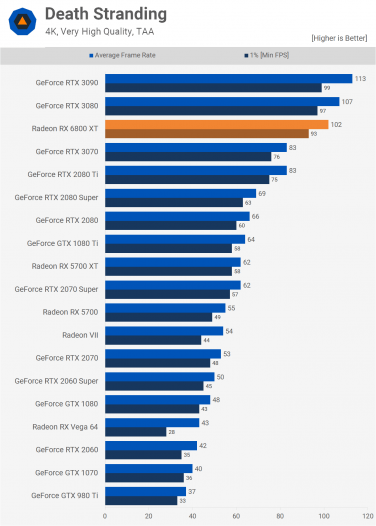
With the current GPU shortages, it may be very difficult to find any of the 2020 cards in stock on Amazon. I wouldn’t usually recommend last-gen hardware, as the leaps in generational performance warrant the added cost. However, if you need a GPU now, your best bet may be looking to older GPUs. This is where the last-gen AMD offering the AMD RX 5700 XT comes in.
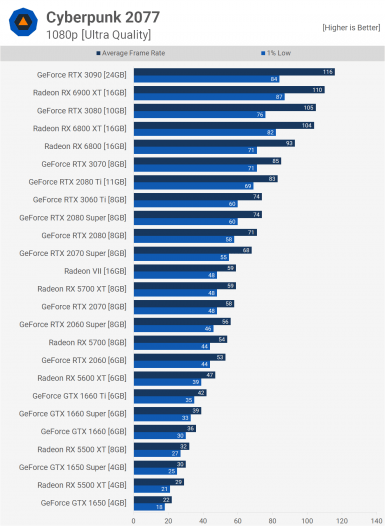
For example, Cyberpunk 2077, even at 1440p, makes even the most expensive GPUs sweat, but at Ultra 1080p, the RX 5700 XT delivers a perfectly playable experience. For most AAA games, you’ll expect to see at least a solid 60 FPS maxed out, though the card, with its limited VRAM and slower memory, will begin to struggle at 4K.
However, the biggest deficiency with the RX 5700 XT is the lack of any dedicated horsepower for real-time hardware accelerated raytracing. Unlike the comparable RTX offerings, there currently exists no raytracing support, and we’re unlikely to see any support for it as AMD have moved their focus to their RX 6000 series GPUs. If you’re looking for a last-gen ray tracing card, this isn’t your choice. But, if you’re instead looking for a solid 1440p ultra graphics card, the RX 5700 XT is worth checking out.
And that brings us to team green’s last-gen offering. Even though this card was released in the latter half of 2018, the RTX 2070 Super still packs a ridiculous punch, and you may still be able to get your hands on one. If you’re unable to get the 2020 beasts on offering, the RTX 2000 series is your only choice if you really want ray-tracing.
Using Nvidia’s 7nm Turing architecture, the utilization of more RT and Tensor Cores brings superior ray-tracing performance over the non-super RTX 2070. All this, with only a small increase in power consumption with a rated TDP of 250 watts.
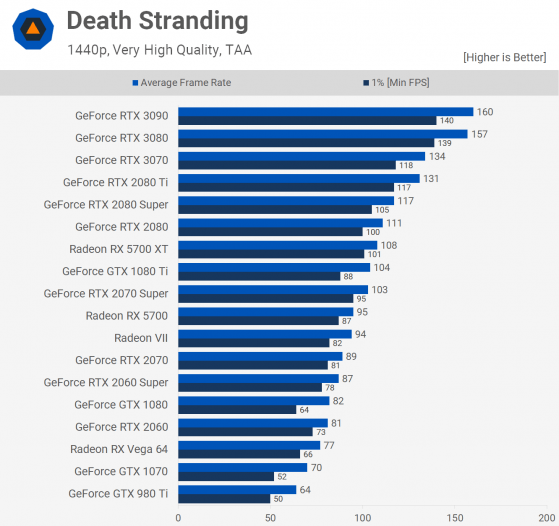
All this only delivers a ~30 FPS deficit when compared to the next-gen RTX 3070, making the 2070 Super an attractive deal when it comes to RTX performance.
The RTX 2070 Super may start to struggle when it comes to 4K performance, especially if you decide to crank RTX on. DLSS 1.0 isn’t as seamless as the RTX 3000 variant DLSS 2.0, so the upscaling can look a little janky compared to what you’d get on an RTX 3070 GPU. Therefore, this card positions itself as a stellar raytracing performer at 1440p and not 4K.
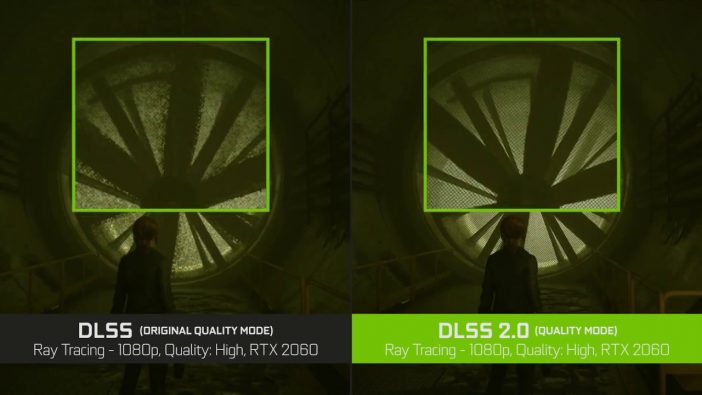
Disclaimer: TechEngage is a participant in the Amazon Services LLC Associates Program. As an Amazon Associate, we earn from qualifying purchases by linking to Amazon.com and affiliated sites. For more info, please read our disclaimer.
For all the latest Technology News Click Here
For the latest news and updates, follow us on Google News.
